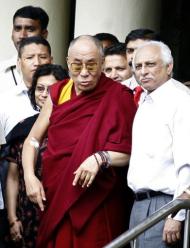Dalai Lama cancels European tour on health grounds: office
AFP, Sept 13, 2008
DHARAMSHALA, India -- Tibetan spiritual leader the Dalai Lama has cancelled his tour next month of Germany and Switzerland for health reasons, his office said Saturday.
 The Dalai Lama has been told by his doctors to rest after being recently hospitalised for with abdominal pains although "his general health condition is good," his office said.
The Dalai Lama has been told by his doctors to rest after being recently hospitalised for with abdominal pains although "his general health condition is good," his office said.
"We are cancelling his tour to allow him more rest and so that he doesn't feel weak immediately again" after his hospitalisation, the Dalai Lama's secretary Tenzin Taklha told AFP.
The Dalai Lama had been due to travel to Germany and Switzerland on October 10 for two weeks to give Buddhist teachings and lectures.
"His Holiness very much regrets the inconvenience this will cause to the organisers of his programmes as well as to those who were looking forward to participating in them," a statement issued by the Dalai Lama's office said.
"We hope everyone will understand the situation," the statement said.
The Dalai Lama returned to Dharamshala in northern India, seat of the Tibetan government-in-exile, on September 9 after recovering from an abdominal illness that put him in a Mumbai hospital for four days.
The 73-year-old Nobel peace laureate had been admitted into hospital for tests after suffering abdominal pain.
His Buddhist teachings scheduled to be held from September 25 to 27 in Dharamshala will take place as planned, his office said. Another set of teachings is slated for September 30 to October 4.
Doctors at the Mumbai hospital had said the Dalai Lama's condition presented no cause for concern and that he "just needed a good rest."
In the weeks preceding his illness, the Dalai Lama had pursued a hectic itinerary as he campaigned for improved human rights in Tibet while China hosted the Olympic Games.
The health scare prompted special Buddhist prayer meetings in Dharamshala, with dozens of monks and nuns gathering at the main temple to pray for his well-being.
The Buddhist monk fled into exile in India in 1959 following a failed uprising in Tibet against Chinese rule.
He champions a "middle path" policy which espouses "meaningful autonomy" for Tibet, rather than the full independence that many younger, more radical activists are demanding.
Still, China vilified him as the "mastermind" of what it called a drive to sabotage the Olympics and destabilise the country.
Violent protests against Beijing's rule broke out across Tibet in March, sparking a heavy Chinese crackdown that drew global condemnation.

 The Dalai Lama has been told by his doctors to rest after being recently hospitalised for with abdominal pains although "his general health condition is good," his office said.
The Dalai Lama has been told by his doctors to rest after being recently hospitalised for with abdominal pains although "his general health condition is good," his office said.